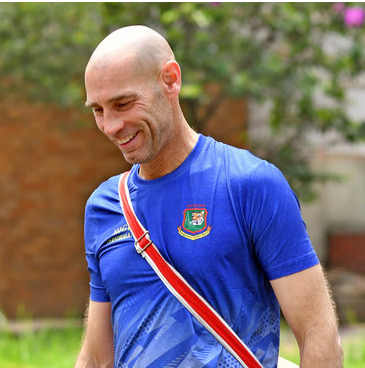
Despite reaching the Super 8s, Bangladesh’s struggles with the bat have been evident.
The consistent failure of the top order is a significant concern, and without their bowlers stepping up, it would have been difficult to see them advancing past the first round.
Placed in the same Super 8 group as Australia, India, and Afghanistan, Bangladesh will need substantial contributions from their batters, especially as the conditions for batting might become more favorable.
So far, in what have been challenging conditions, most teams have benefited from having a top-order batter stay till the end, but this has not been the case for Bangladesh.
Excessive shot-making against the new ball has proven costly.
Bangladesh batting coach David Hemp wants his batters to ensure they are not 15 to 20 runs short, as has been the case in the group stages of the ongoing ICC T20 World Cup.
“We have seen that the wickets in this competition so far have not been conducive to 200 totals, and we need to be smart in assessing the surface and conditions, then adjusting and adapting to give ourselves the best opportunity when batting first.
This will ensure that the bowlers have something to defend.
If we are chasing, we must adapt to the situation.
But when batting first, we need to ensure we are not 15 or 20 runs short due to poor assessment,” Hemp told Cricpulse recently.
“I think if you look at a couple of our innings, if we had scored 15 to 20 more runs, we would have won the game.
We won some really tight games with low scores, but even in the game against the Netherlands, we got 160 (thanks to Shakib) and were in a position to get 180.
Again, it’s about making good decisions, and that’s the challenge.”
Making “good decisions” has been the focus of team discussions in the Bangladesh dressing room lately.
“I think we just need to make better adjustments to the surface we are playing on.
In the four games we played so far, two were reasonable surfaces, and two were challenging,” Hemp said.
“A big part of batting is adjusting to the conditions and making good decisions based on that.
That’s what we’ve been talking about: being ready for the surface, deciding how to play on it, determining what is enough for the surface, and finding effective ways of scoring.”
Bangladesh skipper Najmul Hossain’s batting form in the ongoing tournament is a major concern, as he has only managed to score 26 runs in four games.
His decision to play a reverse sweep early in the innings against the Netherlands was widely discussed.
“The reverse-sweep of Shanto? People can talk about the timing as he only faced a couple of balls, but the reverse sweep is a shot he plays well and backs himself to execute,” Hemp said.
“Batters are going to get out; that’s the nature of the game.
Unfortunately, as a batter, you make one misjudgment, and you’re gone.
It’s different for bowlers who get many opportunities.
A bowler can bowl a bad ball and still get a wicket, but batting isn’t like that.
If batters have a strength, it’s important they stick to and trust that strength.
“You can argue about the timing of the shot or the dismissal, but for him, it’s a shot he’s comfortable playing, and he has played it well in the past.
We want to encourage that mindset.”
Hemp added that he is confident in the out-of-form Litton Kumar Das, who scored 46 runs in four games at the T20 World Cup, and backed him to return to form.
“I think at the moment, Litton is making one misjudgment and falling short, but his movement and the way he is striking the ball have been good,” said Hemp.
“It’s just a case of backing himself a little bit longer.
He is showing glimpses of his capability, but one mistake is costing him,” he added.

Leave a Reply